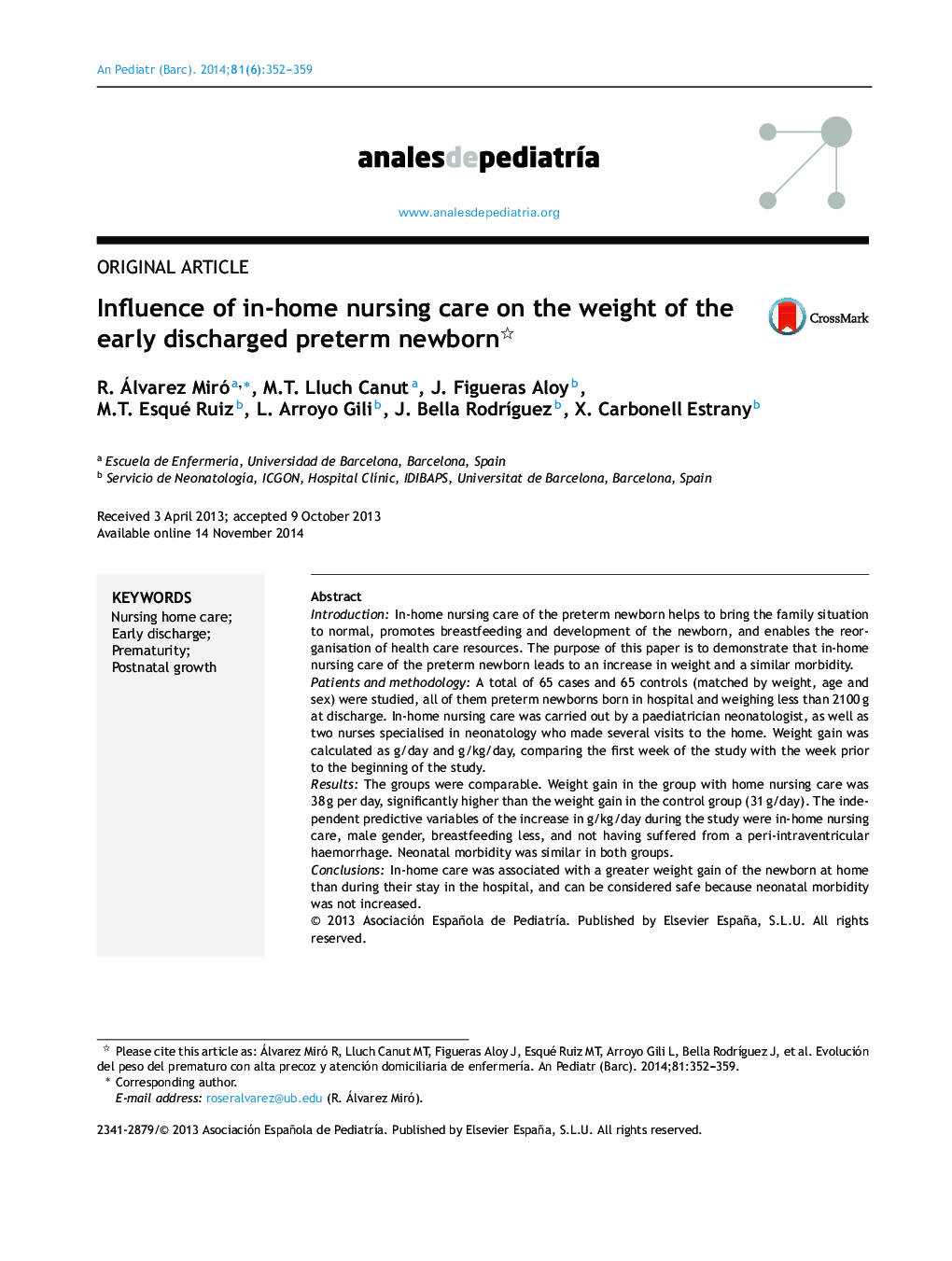| کد مقاله | کد نشریه | سال انتشار | مقاله انگلیسی | نسخه تمام متن |
|---|---|---|---|---|
| 4145209 | 1272594 | 2014 | 8 صفحه PDF | دانلود رایگان |
IntroductionIn-home nursing care of the preterm newborn helps to bring the family situation to normal, promotes breastfeeding and development of the newborn, and enables the reorganisation of health care resources. The purpose of this paper is to demonstrate that in-home nursing care of the preterm newborn leads to an increase in weight and a similar morbidity.Patients and methodologyA total of 65 cases and 65 controls (matched by weight, age and sex) were studied, all of them preterm newborns born in hospital and weighing less than 2100 g at discharge. In-home nursing care was carried out by a paediatrician neonatologist, as well as two nurses specialised in neonatology who made several visits to the home. Weight gain was calculated as g/day and g/kg/day, comparing the first week of the study with the week prior to the beginning of the study.ResultsThe groups were comparable. Weight gain in the group with home nursing care was 38 g per day, significantly higher than the weight gain in the control group (31 g/day). The independent predictive variables of the increase in g/kg/day during the study were in-home nursing care, male gender, breastfeeding less, and not having suffered from a peri-intraventricular haemorrhage. Neonatal morbidity was similar in both groups.ConclusionsIn-home care was associated with a greater weight gain of the newborn at home than during their stay in the hospital, and can be considered safe because neonatal morbidity was not increased.
ResumenIntroducciónLa atención domiciliaria de enfermería (ADE) del recién nacido prematuro próximo al alta en su propio domicilio en lugar del hospital normaliza la situación familiar, favorece la lactancia materna y el desarrollo del recién nacido y permite la reorganización de los recursos sanitarios. El propósito del presente trabajo es demostrar que el prematuro sometido al programa de ADE experimenta un aumento de peso superior en el domicilio respecto al hospital y no incrementa su morbilidad.Pacientes y metodologíaEstudio comparativo de 65 casos y 65 controles (apareados por peso, edad y sexo), prematuros, de procedencia interna y con peso al alta inferior a 2.100 g. La ADE fue administrada por un pediatra neonatólogo y 2 enfermeras especializadas en neonatología dependientes de los servicios hospitalarios, que realizaron visitas seriadas a domicilio. El aumento de peso se calculó por g/día y g/kg/día, comparando la semana previa al inicio del estudio con la primera semana del estudio.ResultadosLos grupos fueron comparables. El aumento de peso en el grupo con ADE fue de 38 g/día, significativamente superior al del grupo control (31 g/día). Las variables independientes predictoras del «aumento en g/kg/día durante el estudio» fueron la ADE, el sexo varón, tomar menos lactancia materna y no haber padecido una hemorragia peri-intraventricular. La morbilidad neonatal fue similar.ConclusionesLa ADE implicó un mayor aumento de peso del recién nacido en casa que durante su permanencia en el hospital, y no aumentó la morbilidad neonatal.
Journal: Anales de Pediatría (English Edition) - Volume 81, Issue 6, December 2014, Pages 352–359
